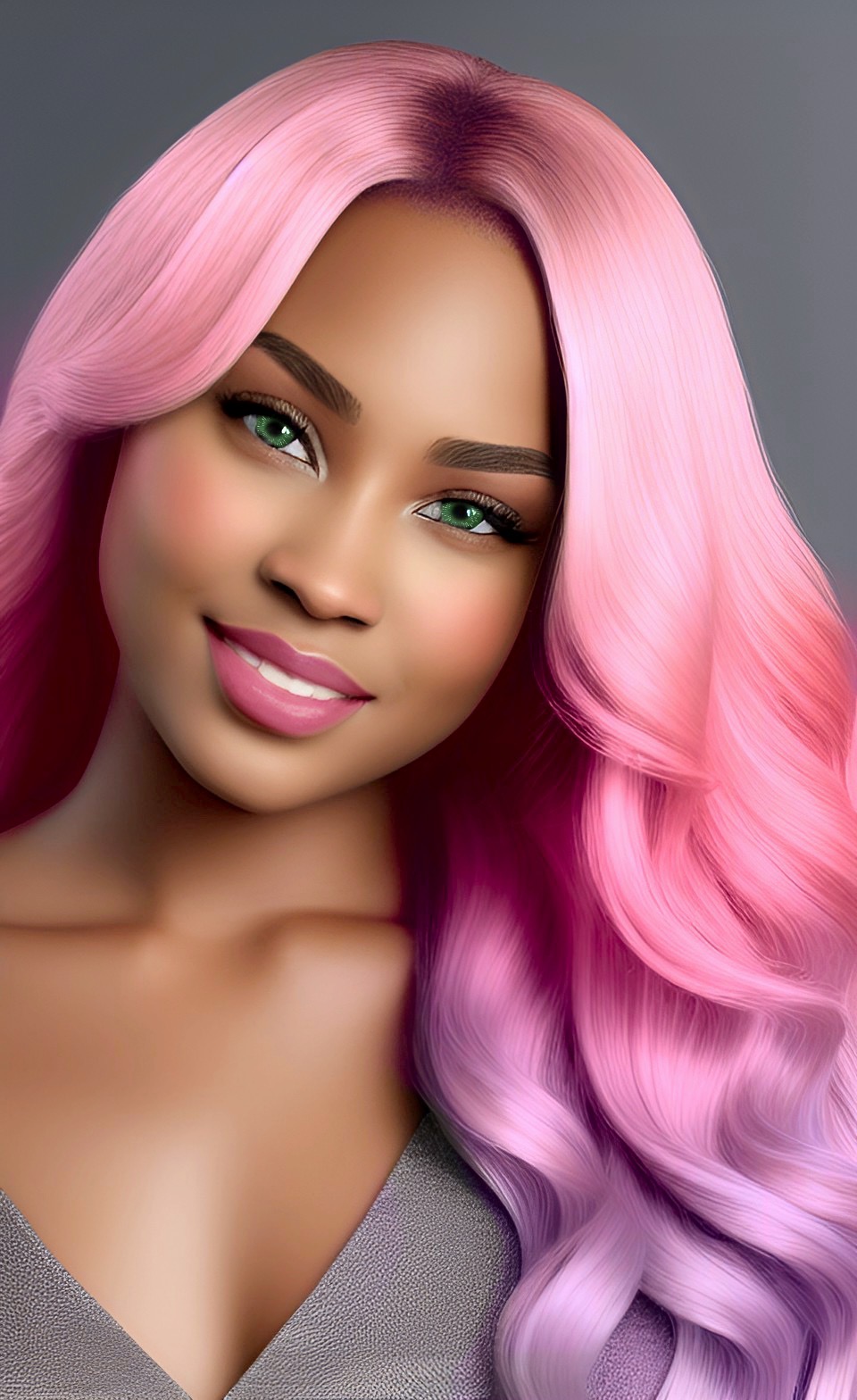The preference for light skin over dark skin, a phenomenon called colorism, has pervaded many societies and cultures worldwide. One way this preference manifests itself is through the practice of skin bleaching, a controversial and potentially harmful method of lightening one’s skin color. This article will explore the impact of skin bleaching on individuals and society at large, using the stories of successful social media influencers who have undergone the procedure as a starting point for discussion. We will also examine the reasons behind the prevalence of skin bleaching in certain regions and provide guidance for those struggling with their skin color in a world that often favors lighter complexions.
The Social Media Phenomenon: Bobrisky and Beyond
Bobrisky, a Nigerian social media influencer, gained fame not only for her captivating personality but also for her dramatic transformation from a dark-skinned man to a light-skinned woman. While her journey to fame was undoubtedly fueled by her gender transition, her decision to bleach her skin also contributed to her rise as a social media star.

Other influencers who have undergone skin bleaching and found success include:
- Dencia: This Cameroonian-Nigerian singer and entrepreneur gained notoriety for her skin-lightening product line, Whitenicious. She has been open about her own skin-bleaching journey and has amassed a large following on social media.
- Mshoza: A South African musician, Mshoza gained fame in her home country before deciding to bleach her skin. Despite facing backlash for her decision, she remained a popular figure in the entertainment industry until her untimely passing in 2020. Her influence and legacy continue to live on, as her story sparks conversations about colorism and skin bleaching
- Huddah Monroe and Vera Sidika: These Kenyan socialites and entrepreneurs have both been open about their decisions to lighten their skin. Huddah Monroe, a former Big Brother Africa contestant, and Vera Sidika, a prominent video vixen, have each amassed a significant following on social media and have been influential in Kenya’s entertainment industry. Their experiences with skin bleaching have sparked discussions about colorism, societal beauty standards, and the pressure to conform to these expectations. By sharing their journeys, they have brought attention to the complex issues surrounding skin color and the impact of skin bleaching on individuals and society at large.
Why the Examples Given of Skin Bleaching Influencers are All People Who Hail from countries in the African Continent
In the previous sections, we provided examples of social media influencers who have undergone skin bleaching, all of whom come from African countries. This choice of examples was intentional, as it highlights the prevalence and impact of colorism and skin bleaching within the African continent. However, it is essential to recognize that skin bleaching is a global phenomenon that affects various cultures and societies worldwide.
The African Context

The focus on African influencers sheds light on the unique cultural and historical factors that contribute to the prevalence of colorism and skin bleaching in African countries. Some of these factors include:
- Colonial Legacy: The colonization of Africa by European powers introduced Western beauty standards to the continent, often favoring lighter skin as a marker of beauty and social status. This historical influence has contributed to the persistence of colorism in African societies today.
- Media Representation: Local media and advertising in many African countries predominantly feature light-skinned individuals, reinforcing the idea that lighter skin is more desirable. This perpetuates colorism and can contribute to the demand for skin bleaching products and procedures.
- Social and Economic Factors: In some African societies, lighter skin is associated with higher social status, wealth, and education. As a result, individuals may feel pressure to bleach their skin in pursuit of these perceived advantages.
- Influence of Celebrities and Public Figures: When famous individuals like Bobrisky, Huddah Monroe, and Vera Sidika openly discuss or promote skin bleaching, their actions can normalize the practice and encourage others to follow suit.
A Global Perspective
While the focus on African influencers highlights the issue of skin bleaching within the African context, it is important to acknowledge that colorism and skin bleaching exist worldwide. In countries across Asia, the Caribbean, and Latin America, the preference for lighter skin can be seen in various forms, from the popularity of skin-lightening products to the representation of beauty in the media.
The fight against colorism and the harmful practice of skin bleaching requires a global effort, addressing the underlying prejudices and societal pressures that drive individuals to alter their natural skin tones. By raising awareness about the issue, celebrating diverse beauty, and promoting self-love and acceptance, we can work towards a more inclusive and equitable world where everyone is celebrated for their unique and natural beauty, regardless of their skin color.
Are there any famous Americans who are known to have bleached their skin?

There are no widely known cases of famous Americans who have openly admitted to bleaching their skin. However, there have been speculations and rumors surrounding some celebrities’ changing appearances, which some attribute to skin bleaching or lightening. It is essential to note that these claims are often unverified and based on conjecture. Factors such as makeup, lighting, and natural changes in skin tone over time can contribute to the appearance of lighter skin in photographs and public appearances.
It is also worth mentioning that skin lightening treatments, such as chemical peels and laser treatments, are sometimes used by celebrities to address skin issues like hyperpigmentation and acne scars. However, these treatments are not the same as skin bleaching, which involves intentionally lightening one’s overall skin color.
The Hypocrisy of Colorism: Condemning Skin Lightening While Preferring Light Skin
A striking paradox exists in societies around the globe when it comes to colorism and skin lightening. On one hand, people who bleach their skin often face backlash and criticism for altering their natural skin color, while on the other hand, the same societies that condemn these practices often show a clear preference for lighter skin tones. This hypocrisy is worth examining, as it sheds light on the deeply ingrained and complex nature of colorism.
- The Role of Cultural and Historical Factors: As previously discussed, the preference for lighter skin can be traced back to historical and cultural factors such as colonization, the influence of European beauty standards, and associations between lighter skin and higher social status. These factors continue to shape societal beauty ideals, leading to the paradoxical situation where lighter skin is favored, but those who actively try to achieve it are often criticized.
- The Stigma of Skin Bleaching: The act of skin bleaching is often seen as an extreme measure and may be viewed as a rejection of one’s natural beauty and heritage. This stigma contributes to the hypocrisy surrounding colorism, as individuals who undergo skin bleaching may be criticized for their actions even though they are trying to conform to the very beauty standards that society promotes.
- Internalized Colorism: The preference for lighter skin is often so deeply ingrained in society that even those who are victims of colorism may unconsciously perpetuate these biases. This internalized colorism can manifest in various ways, from favoring lighter-skinned friends and partners to making derogatory comments about darker skin tones. This further fuels the hypocrisy surrounding colorism and skin bleaching.
- The Health Risks of Skin Lightening: Part of the criticism directed at those who bleach their skin may stem from concerns about the health risks associated with the use of potentially harmful skin-lightening products. However, this concern does not negate the hypocrisy of condemning skin lightening while simultaneously perpetuating colorist attitudes.
To address the hypocrisy surrounding colorism and skin lightening, it is crucial to acknowledge and challenge the underlying assumptions and prejudices that drive these attitudes. This can be achieved through education, promoting diverse beauty standards, and engaging in open conversations about the impact of colorism on individuals and society. By dismantling the power structures that uphold colorism, we can work towards a more inclusive and equitable world where everyone is celebrated for their unique and natural beauty.
Is the hypocrisy of colorism prevalent in American society?
Yes, the hypocrisy of colorism is prevalent in American society, though it manifests in different ways compared to other societies around the world. Colorism in the United States has deep roots in the country’s history, including the legacy of slavery, segregation, and institutional racism. Although the issue of colorism is more complex and multifaceted in American society due to its diverse population, the preference for lighter skin and the discrimination faced by those with darker skin tones is a shared experience among various communities.
Some examples of colorism in American society include:
- Media Representation: Historically, American media has predominantly featured lighter-skinned individuals, particularly in roles associated with beauty, success, and affluence. This bias can be observed in the film and television industries, as well as in advertising and fashion. Although there has been progress in recent years to increase diversity and representation, colorism remains an issue that shapes societal beauty standards and preferences.
- Implicit Bias: Studies have shown that lighter-skinned individuals, especially those from racial and ethnic minority groups, are often perceived more favorably than their darker-skinned counterparts. This implicit bias can impact various aspects of life, including employment, education, and social interactions.
- Internalized Colorism: Similar to other societies, individuals within the United States may unconsciously perpetuate colorist attitudes due to internalized beliefs about the superiority of lighter skin. This can manifest in discriminatory behaviors or preferences, even among members of the same racial or ethnic group.
- The Stigma of Skin Lightening: While skin bleaching is less common in the United States than in some other countries, there is still a stigma associated with altering one’s skin color to conform to societal beauty standards. This can contribute to the hypocrisy of colorism, as individuals who take extreme measures to achieve lighter skin may be criticized for their actions, even as society continues to uphold and promote the preference for lighter skin tones.
Addressing the hypocrisy of colorism in American society requires a comprehensive approach that includes education, increased representation of diverse skin tones in media, and open dialogue about the impact of colorism on individuals and communities. By acknowledging and challenging the deeply ingrained prejudices and biases that perpetuate colorism, we can work towards creating a more inclusive and equitable society.
The Impact of Skin Bleaching on Society and Individuals
The prevalence of skin bleaching, especially among high-profile individuals like those mentioned above, has significant implications for society. By promoting lighter skin as a symbol of success and beauty, these influencers may inadvertently perpetuate the idea that dark skin is less desirable, exacerbating existing colorism issues.
Furthermore, the normalization of skin bleaching can lead to increased demand for skin-lightening products, many of which contain dangerous and potentially harmful ingredients. The long-term effects of these products on the health of individuals who use them are not yet fully understood, but they can cause immediate skin damage, such as burns, scarring, and pigmentation issues.
Individuals who undergo skin bleaching may face their own set of challenges. In addition to the potential health risks, maintaining a lighter complexion can be both time-consuming and costly. Bobrisky, for instance, has acknowledged the difficulties of maintaining her lighter skin tone in a documentary. Additionally, those who bleach their skin may experience backlash from others who view their decision as a rejection of their natural beauty or as an attempt to conform to harmful societal norms.
Colorism’s Impact on Everyday Life
Colorism affects individuals in various aspects of their lives, including relationships, job opportunities, and social interactions. Those with darker complexions may face discrimination or bias, which can have long-lasting effects on self-esteem and mental health. As a result, individuals may feel pressure to alter their appearance to align with societal preferences for lighter skin tones.
Regional Differences in Skin Bleaching Prevalence
Skin bleaching is more common in certain parts of the world, such as Africa, Asia, and the Caribbean. This is due in part to the influence of historical events, such as colonization and the introduction of European beauty standards. In these regions, lighter
skin is often associated with higher social status, wealth, and attractiveness. Additionally, local media, advertising, and beauty industries may perpetuate these preferences by predominantly featuring light-skinned individuals, reinforcing the idea that lighter skin is more desirable.
Navigating a World that Favors Light Skin: What Can Be Done?
For those who feel conflicted about their skin color in a world that often favors lighter complexions, it is important to acknowledge and challenge the underlying assumptions and prejudices that drive colorism. Here are some steps individuals can take:
- Educate oneself and others about the history and impact of colorism, as understanding its origins can help to dismantle its power.
- Celebrate and promote diverse beauty by supporting models, actors, and public figures of various skin tones, and by sharing positive messages and imagery that challenge conventional beauty standards.
- Encourage open and honest conversations about skin color and its impact on self-esteem, relationships, and opportunities, as this can help to break down stereotypes and reduce discrimination.
- Support campaigns and organizations that work to combat colorism and promote self-love, such as the “Dark is Beautiful” campaign in India or the “Black is Beautiful” movement in the United States.
- Lastly, practice self-acceptance and self-love. It is essential to recognize that every individual has intrinsic worth and beauty, regardless of their skin color.
The Bobrisky Factor: Exploring the Intersection of Colorism, Gender, and the Pursuit of Fame and Fortune
Bobrisky’s transformation from a dark-skinned man to a light-skinned woman provides an opportunity to explore the complex interplay of colorism, gender, and the pursuit of success in today’s society. There are several possible reasons why someone in Bobrisky’s position might believe that a change in skin tone and gender would increase their chances of achieving fame and fortune.
- Conforming to Societal Beauty Standards: As previously discussed, lighter skin is often perceived as more desirable in many societies due to colorism. By lightening her skin, Bobrisky may have felt she would more closely align with these societal beauty standards, thereby increasing her appeal and chances of success.
- Standing Out in a Competitive Industry: The world of social media and entertainment is highly competitive, with countless individuals vying for attention and success. Bobrisky’s dramatic transformation might have been seen as a way to stand out from the crowd and garner more attention, which could translate to greater success in her career as a social media influencer.
- Challenging Gender Norms: By transitioning from male to female, Bobrisky challenged traditional gender norms and expectations. This act of defiance may have been seen as a way to attract attention and generate conversation, thereby increasing her visibility and potential for success.
- Intersectionality of Gender and Colorism: The experiences of women, particularly women of color, can be significantly different from those of men when it comes to societal expectations and opportunities. By transitioning to a light-skinned woman, Bobrisky may have believed that she would be better positioned to navigate these challenges and take advantage of opportunities that might not have been available to her as a dark-skinned man.
- Empowerment and Self-Expression: Bobrisky’s decision to transition and bleach her skin might also be seen as an act of empowerment and self-expression. By taking control of her appearance and identity, she may have felt more confident and able to pursue her dreams, regardless of societal expectations or limitations.
It is important to note that these explanations are speculative and may not fully capture Bobrisky’s motivations or experiences. However, they do provide a starting point for understanding the complex relationship between colorism, gender, and the pursuit of success in today’s society. To create a more inclusive and equitable world, it is essential to challenge and dismantle the societal norms and prejudices that drive individuals to make such drastic changes to their appearance and identity.
Conclusion
The practice of skin bleaching and its association with success, as evidenced by social media influencers like Bobrisky, Dencia, Mshoza, and Diamond Platinumz, highlights the pervasive issue of colorism in society. The impact of skin bleaching is far-reaching, affecting not only the individuals who undergo the procedure but also the broader society, reinforcing harmful beauty standards and perpetuating discrimination based on skin color.
To create a more inclusive and equitable world, it is crucial to address colorism head-on, dismantling the underlying prejudices that drive it and promoting diverse beauty standards that celebrate and uplift individuals of all skin tones. By doing so, we can foster greater self-love, acceptance, and unity, allowing everyone to embrace their unique and natural beauty.

